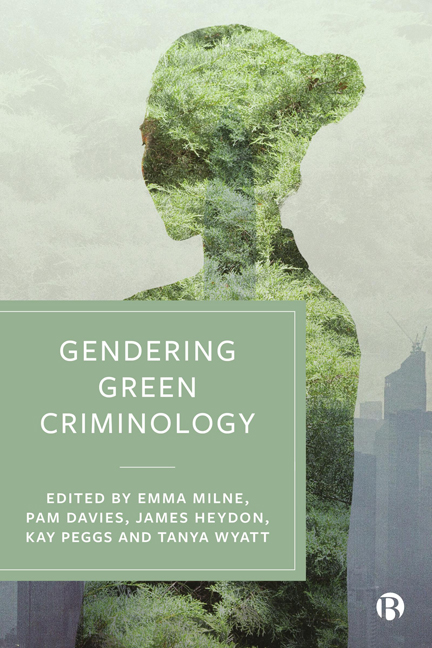Foreword
Published online by Cambridge University Press: 28 March 2024
Summary
Green criminology is an urgent field of criminology that has expanded tremendously alongside the growing nature crisis caused by human-induced climate change and dramatic species loss due to anthropogenic action, or lack of action. This in turn has led criminologists all over the world to engage in research on different forms of harms and crimes committed against nature and nonhuman animals. Cooperation between scholars in the Global North and the Global South has formed part of this transnational endeavour to address environmental crimes from non-colonialist, non-anthropocentric point of departures, bridging people, knowledge and scholarship. This book is an excellent example of the international character and fusion of different disciplines and fields of green criminology. Most importantly, this book presents us with the gendered aspects of green crimes and environmental harms and the ways in which neither offending nor victimisation of such harms are gender neutral, but caused by overarching structures, such as colonialism, capitalism and patriarchy.
While feminist theorisation has been important in critical criminology generally, in green criminology, unfortunately, it has been more absent and while intersectional theorisation swiped sociology and other social sciences in the beginning of this century, green criminology seemed generally unaffected by this theoretical approach. Applying intersectional theory methodologically is not an easy task due to its complexity (McCall, 2005). For example, when does one aspect of a person's identity, which renders the person vulnerable to oppression, end and another begin? What factors intersect where, when, how and why? These questions, I think, are questions many feminist social scientists have grappled with since intersectionality was introduced as a theoretical concept. Nonetheless, the underlying basis of this approach; that multiple features and mechanisms that shape different aspects of oppression and victimisation intersect, for example, class, ethnicity, gender, and not the least species affiliation, are important to keep in mind, and that is one important endeavour of this book.
Prior to intersectionality theory and perhaps more familiar to green criminology, eco-feminism appeared as an interdisciplinary feminist approach to the natural world, nature ethics and nonhuman animals. Ecofeminism (for example, Donovan and Adams, 1996; Kheel, 2007) as well as intersectionality are important in the analysis of offending and victimisation in regard to environmental crimes, harms and nonhuman victimisation. These perspectives are also vital in relation to activism and protest, so well exemplified in Part III of this book.
- Type
- Chapter
- Information
- Gendering Green Criminology , pp. xiii - xivPublisher: Bristol University PressPrint publication year: 2023



